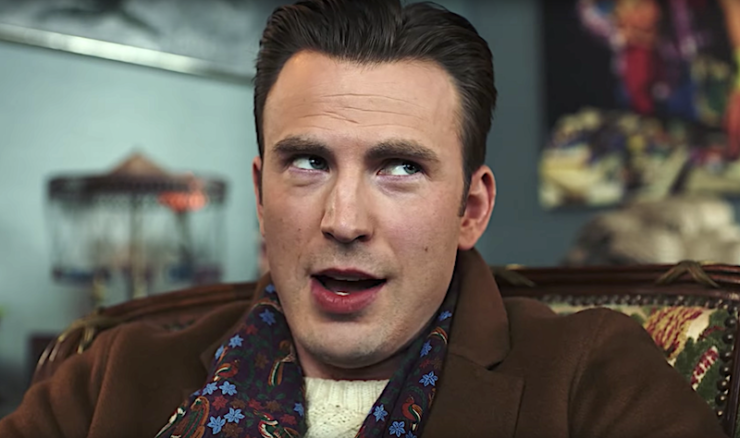Knives Out could have been a lot of things.
The trailers promised a fun whodunit, a Clue for a new generation. A smirky, snarky role for post-Captain America Chris Evans. A return to quirky genre films for a post-Star Wars Rian Johnson.
And be assured, it is all of those things.
But rather than coasting on the film’s considerable visual style or the script’s sharpity sharp sharp wit, Rian Johnson has taken the coziest, tropiest of genres and used it to tell a story about America—and he’s made my favorite movie since Mad Max: Fury Road.
First, a very basic rundown:
Do you like mysteries? Go see it!
You don’t like mysteries? I still think you’ll find something to like.
You want to hear Daniel Craig’s ludicrous-yet-perfect Shelby Foote-based Suh-thuhn accent? Sherman’s March your ass to the theater.
You like watching Chris Evans ripple his jawline and lounge handsomely in the snuggliest sweaters you’ve ever seen? …you’re probably already in the second row.
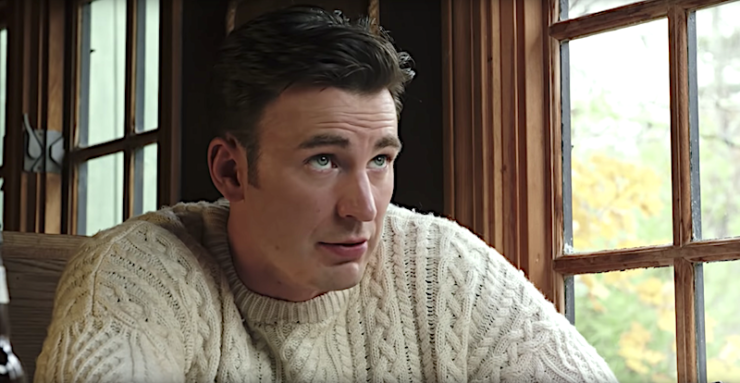
You’re furious with your family and you want to gesture angrily at the screen each time one of the Thrombeys does something dickish, in order to underscore how insufferable they all are? Really go see it.
You love your family and you want to be reminded of how lucky you are to have them, and not people like the Thrombeys? Get thee to a multiplex!
But perhaps you’d like some plot? Here is a very bare-bones description. Harlan Thrombey (go ahead, say it aloud. Let it roll around your molars for a sec. Do you understand why I’m about ready to go door-to-door handing out pamphlets with Rian Johnson’s face on them?) is a very famous and very rich writer of mysteries. Or, at least he was, before an apparent suicide. His grieving, extravagantly fucked-up family gathers to mourn/attend the will reading, and then Daniel Craig shows up and drawls that he “suspects foul play” and recruits Harlan’s nurse, Marta, to be his Watson.
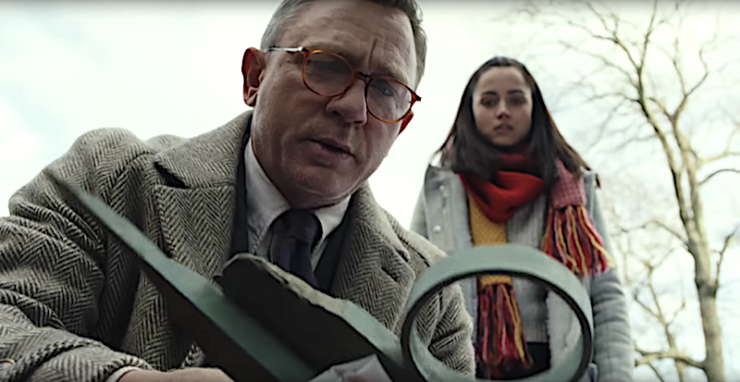
That of course isn’t the real point of the film. The point, on the surface, is that Rian Johnson has given us a delicious mystery that riffs on Clue, Deathtrap, Columbo, Murder She Wrote, and even a little And Then There Were None. The set design is wonderful, with weird little trinkets and over-the-top oil paintings in every corner. The costuming is just—look, I’m a jeans and t-shirts person, anything that requires effort infuriates me, but I demand to wear some combination of the main characters’ wardrobes going forward. I already mentioned the sweaters, but there’s also Daniel Craig doing his best Posh Southern Columbo look, and Jamie Lee Curtis dressing in bold monochromes like she can’t decide whether to be Miss Scarlet or Mrs. Peacock.
I could say the performances are perfect but that doesn’t even convey just how fantastic it is to sit in the theater and watch long-time genre franchise veterans Jamie Lee Curtis, Daniel Craig, and Chris Evans subvert their most famous roles while a roomful of fans freaks out. Between this and Watchmen Don Johnson has decided to remind people he’s an incredible actor. Michael Shannon is convincingly nonthreatening…until he needs to be threatening and then holy shit.
Toni Collette.
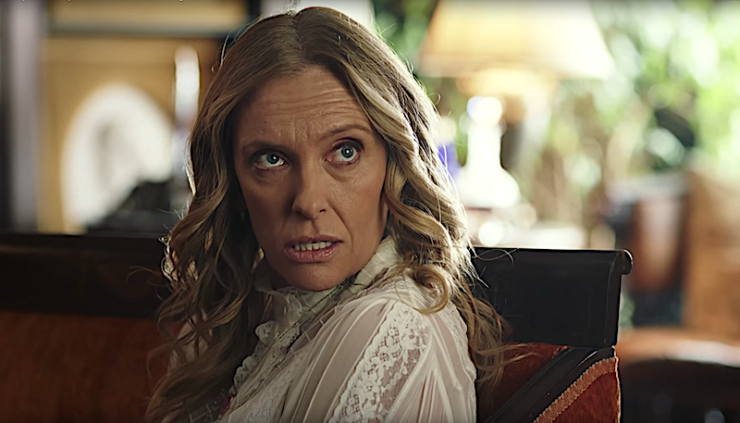
Just, Toni Collette, that’s the sentence.
Jaeden Martell (playing a walking, talking, tweeting dig at all the bros who claimed Rian Johnson ruined their childhoods with The Last Jedi) does more with a paragraph’s worth of lines than either Will Smith did with pages and pages of Gemini Man. But none of them come even close to Ana de Armas, who, as Marta, has the extremely difficult role of being a real, quirk-free human being, with real emotions and real stakes, surrounded by batshittery on all sides. She’s the beating heart of the film, and grounds it beautifully.
Having told you all that: I don’t want to give a single thing away about this film. I was lucky enough to go in as a tabula rasa, and I want the same experience for all of you.
Thus I implore you: if you have not seen the film please dip out now.
SPOILERS AHEAD!
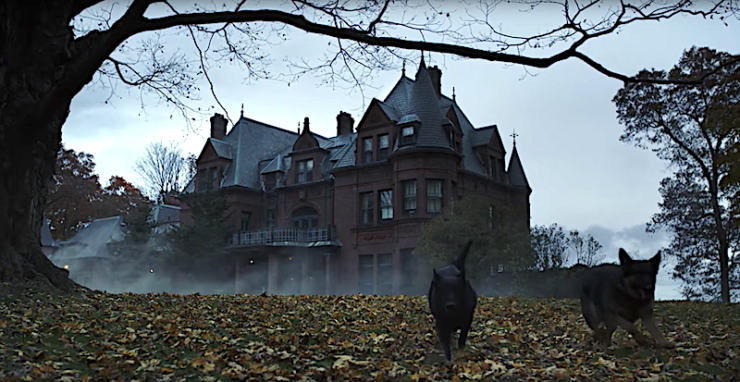
We’re good? All of you have seen the film, and you’re ready to talk about it?
Cool.
Let me first say:
HOLY SHIT HOW GOOD IS THIS THING???
AND HOW IS IT THIS GOOD???
The ads promised us a fun film but they did not mention that Rian Johnson has made a movie about how hard it is to be a moral person living under an immoral system? About how even the most well-meaning of liberals will turn mean if you threaten their status? About fucking race relations???
Whenever an artist is going to create something they have a choice to make. Do you work within the genre, and try to create a perfect example of the genre? Do you subvert the genre in a way that fans of it will appreciate? Do you deconstruct it to try to make the genre itself stronger by revealing its bone structure? Do you explode it cause you hate it? Or do you use the genre tropes to tell a different story?
Agatha Christie’s Murder on the Orient Express is a perfect example of a “locked room” mystery. The characters are more trope than man—they serve their functions, and supply tragic backstory when required. The locked room aspect is airtight because it’s a freaking moving train. The detective is there by accident—but of course his presence isn’t an accident at all, because he’s there to imply the larger moral structure governing the universe. But Christie also tweaks the genre a tiny bit by making her story the ultimate whodunnit—because they all dunnit. And the basic goodness of the universe is affirmed not by the murderers being sent to prison, but by Poirot recognizing that the greater evil, Ratchett, has finally paid for the horrific crime of murdering a baby.
The original film continues this, by gathering a glamorous all-star cast to act all their trope-characters to the hilt. It’s fun as fuck. The 2017 remake is a very gentle subversion in that Branagh uses a much more diverse cast to make subtle hints about racism and anti-Semitism. Not enough to interrupt the flow, just enough to show you this is a modern production, and everyone’s very aware of the need for diversity in film. Columbo functions as a stronger subversion—each episode shows us the murder, and we go into the mystery knowing not only whodunnit, but often at least some of how—but the writers do usually give you a few clues to figure out along the way. Speaking of, Clue is what I’d call a fluffy deconstruction, where all the tropes are lampshaded and the victim is literally named Mr. Boddy. Deathtrap is a more serious deconstruction—you go into the film thinking you’re watching a person trick another into being an accomplice to one murder, but then you find out the actual target is someone else entirely. And then twenty minutes later the who plot turns itself inside out again. And I would argue that And Then There Were None is actually an example of an explosion, because Christie, banking on her reputation, gives us a story that acts like a locked room mystery, but is in actuality an inexorable snuff story.
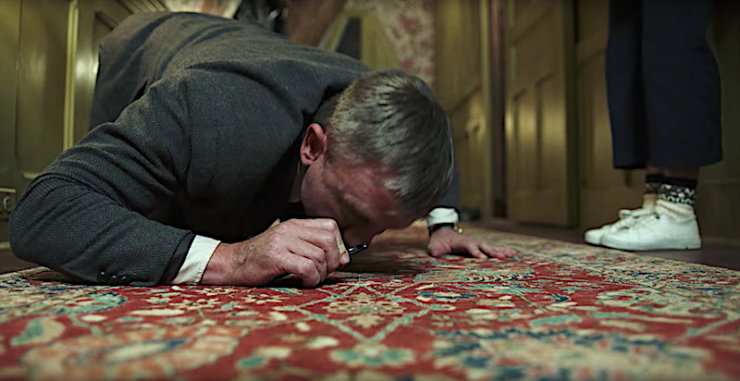
I don’t know if I can tell you how excited I was when I realized Knives Out is in the last camp. As I said, artists all have choices to make. You can choose to make easy fluff or you can make work that will challenge audiences, and maybe, hopefully, speak to people. Are you going to speak specifically to your time and society?
I mean, you don’t have to.
But often the media that seems to have the biggest impact and staying power are the movies, books, and TV shows that take a premise that could have coasted on its tropes, and instead use that premise to engage with the world around you and question the assumptions of your culture.
Mad Max: Fury Road could have just been a romp. In an alternate universe, Tom Hardy escapes the War Boys, happens upon Furiosa and the women escaping from Immortan Joe, and he takes the lead on the adventure while Furiosa helps him. Jordan Peele could have made Get Out a creepy modern haunted house story, and added a nice, helpful white person in there somewhere. The Ghostbusters reboot could have just shoved standard jokes about busting ghosts into the characters’ mouths, instead of having Holtzmann give Erin Gilbert a goddamn switchblade while telling her that every woman should carry a weapon. The Shape of Water could have been a feel-good fairy tale of good triumphing easily over racism, homophobia, and McCarthyism. Barry could have been a wacky Get Shorty-style fish-out-of-water comedy. The Good Place could have stuck to its initial premise about a garbage person who got into Heaven by mistake, and has to con everyone in order to stay.
When Rian Johnson was handed the keys to the Millennium Falcon, he had a decision to make—just do a fun Star Wars movie like The Force Awakens, or see how far the “Star Wars movie” as an idea could stretch. Obviously he chose the latter, resulting in my favorite take on Star Wars, and a LOT of internet-based ennui. He gave us a chosen one who isn’t part of some great royal lineage. He gave us a space janitor (one of my very favorite types of character) who’s the bravest resistance fighter of them all. He showed us General Leia Organa using the fucking Force in a movie, not in a tie-in book. He showed us the actual human cost of gung ho thoughtless maverick masculinity. Best of all, he showed us that Luke had finally become the Jedi master he always wanted to be: Luke’s power is in his mind, his compassion, his willingness to step out of Rey’s way—he is everything Yoda once said he could never become.
With Knives Out Johnson has chosen to take the most formulaic of genres and use it to tell a pro-immigrant, pro-refugee, anti-white-supremacy story. Everyone in the Thrombey family is complicit in an overarching moral crime, if not in the crime that Benoit Blanc is investigating. And in the end, everyone is indicted—revealed to be shallow at best and starkly uncaring at worst.
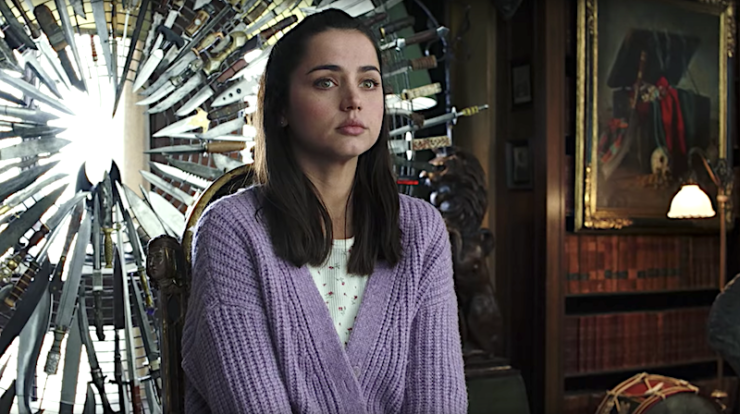
The whole film is built around questions of morality. Rian Johnson gives us a main character who literally vomits when she tells a lie, and then places her in a situation where she has to lie incessantly. By committing to this ludicrous quirk, the film becomes an interrogation of the nature of truth itself. Will Marta puke if she just…hides the truth? If she lies by omission? If she lies to make other people feel better about themselves and their motives? Actually straight-up telling an untruth is out, we see that immediately, but when she talks around the truth she can usually go a few minutes before the vomiting starts. Does that mean truth is a spectrum in the world of Knives Out? Even aside from the damage to her esophageal lining, each tiny lie, even when told with the best of intentions, only leads to more problems.
Of course, there’s another turn toward the end of the film, in which Johnson addresses an underlying, but unstated, philosophical issue. By giving Marta the absurd gimmick that she pukes when she lies, he could have created a scenario where she’s being forced to be honest. She could have been portrayed as a comic slave to her bile, with no free will at all—a person who told the truth only because she feared the consequences. But Johnson makes sure that the crux of her personality comes through in a scene that has nothing to do with lying. When Marta finds Fran in an abandoned store, OD’ing on morphine, she could just give her the antidote, call 911, and run. But she chooses to stay with her despite the fact that waiting for the ambulance dooms her, and possibly even her mother. Fran, who has been the butt of the joke at best, and completely forgotten by the film at worst, is more important to Marta than her own safety. And in the end it’s Marta’s choice to stay that saves her.
Johnson builds his class critique just as deftly as his commentary on racism. Fran, a poor white woman, keeps the house running and is largely ignored. When she tries to fight back against Ransom, not really for the money but just so that he has to face a consequence for once, she dies a horrible death offscreen. Marta, a working-class woman of color who lives at home with her mom and her sister, has been doing the hard work of caring for Harlan the whole time, and this leads directly to her inheriting the earth, metaphorically speaking, by literally inheriting the house, the property, the book rights, and the liquid money—all $60,000,000 of it. And of course the family, who has been sucking their dad’s teat for decades, freak out. But here’s the thing—they’ve made themselves irrelevant. They’re not willing to do the work, so why the hell should they get the money?
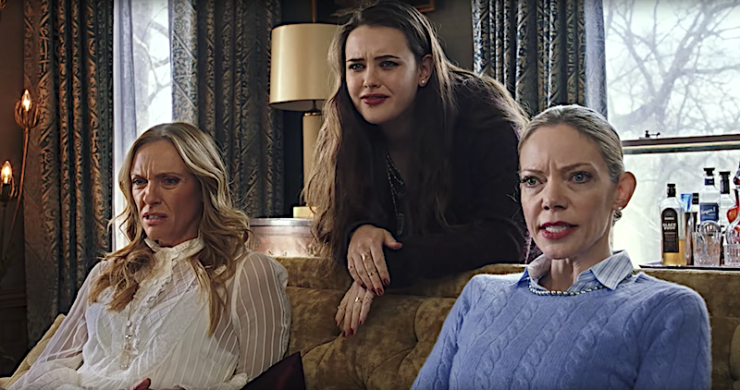
Johnson makes sure that all the Thrombeys are complicit. Sure, Walt’s wife is a pearl-clutching, racist snob, but the others aren’t actually any better. They’ll allow Marta to be Harlan’s nurse, but the moment she “oversteps her place” the insults and accusations come out. Meg will angrily react to Marta being called the help, but what about the actual help? Everyone’s comfortable calling her “kiddo” and “honey”, ignoring the fact that she’s a trained nurse with a job, not another trust fund child. Richard Drysdale drags Marta into a conversation about refugees and immigration because he blithely assumes she’ll agree with him, and he won’t really rate her opinion if she doesn’t. As much as Linda and Joni tell him to “leave the poor girl alone” they also don’t make space for Marta (again, an adult, not a girl) to tell them her genuine thoughts. Neither do they shut him down effectively enough to actually have Marta’s back, despite all their faux maternalism. No one in the family knows where Marta’s family is from, and as a result, we in the audience never find out. Jacob spends the entire movie posting hate speech online, and none of the adult “progressives” in the family do more than joke about it. Are they any better than Ransom, who makes the servants call him by his first name, Hugh, in order to emphasize his distance from them? Even Meg, who acts like Marta’s friend, betrays her the second she thinks her cushy life is in danger. It either doesn’t occur to her that maybe Marta would help her out of kindness or, more likely, the idea of having to rely on Marta’s kindness drives her nuts. Meg just doesn’t want to face the fact that she, a college student, considers a working, trained nurse to be somehow beneath her, because facing that truth would make it harder to hate her alt-right cousin.
Marta’s doing the work that none of them are willing to do, and they love feeling good about themselves for treating her like family. But who the fuck would want to be part of that family?
Rian Johnson could have let us off the hook—Ransom could have been a nice person under all those “eat shit”s, but he truly is a venal, callow dick. Meg could have defended Marta, but instead she’s a hypocrite. Even poor doomed Fran—everyone seems to know about her stash of illegal weed, but no one does anything about it? Isn’t she breaking the law just as much as Marta’s mom did by coming into the country illegally? Dumb laws are still laws, after all. But the Thrombeys just giggle about Fran’s stash—or raid it—and then use Marta’s mom’s citizenship status as leverage. The one mystery trope that goes mostly unquestioned is The Above-It-All Sleuth…and even he gets tweaked a little bit. Yes, Benoit Blanc comes into the case unexpectedly, is outside the social order he’s investigating, and claims to have an unerring dedication to the Truth. Blanc is a Southerner surrounded by New England WASPs, and he seems like a genuinely decent person. But even with this character, Johnson complicates things. Blanc allows Marta to flail on the end of his hook for a lonnnng time, having clocked her as a suspect immediately, because he wants to figure out who hired him. But was that a decent thing to do, morally speaking? Was he hoping she’d exonerate herself if he gave her enough time? Or was he just so self-obsessed that he was blind to the agony he was causing her? Is he just another clueless, thoughtless, safe, upper-class guy?
I’ve mentioned Fury Road a few times now. I realize that on the surface the films could not be more different, and yet…George Miller et al used an eggs-to-the-wall action movie to Trojan Horse a story of feminism, trauma, and healing into America’s summer movie schedule, and now Rian Johnson has used his whodunnit to comment on the evils of white supremacy just in time for holiday family movie outings. He chose to take mystery, an essentially conservative subgenre, in which the social order is disrupted by a villain, the detective rides in and apprehends the villain, and society can knit itself back together, and turn it into a story that deliberately upends the social order.
The last comes fucking first.
Just in caseLeah Schnelbach wasn’t clear: THIS MOVIE IS AMAZING. Come solve the mystery with them on Twitter!










